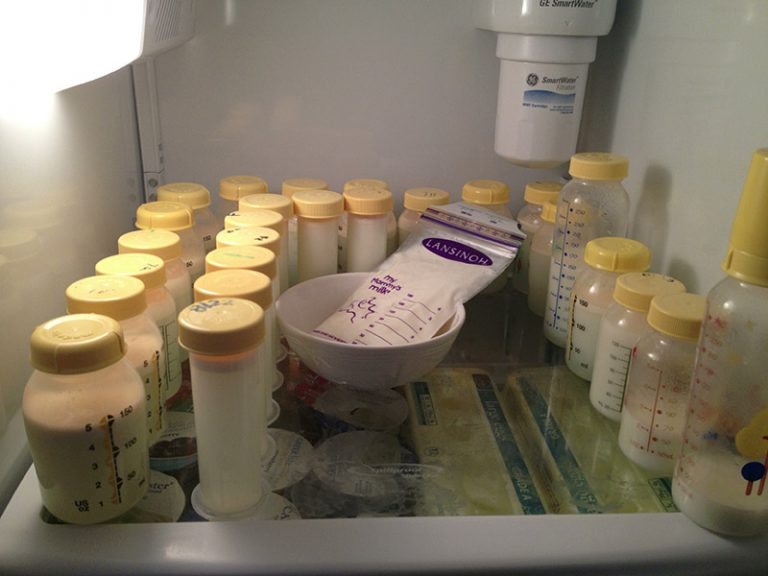Excess Lipase In Breast Milk (Get The Facts So You Can Avoid Dangers!)
Breast milk is produced by mothers daily at the right temperature, with maximum freshness. Unfortunately, if the mother chooses to pump breast milk for storage, the milk will slowly deteriorate over time. Some mothers say that their stored breast milk has a distinct soap-like taste and odor.This is actually caused by lipase.
Here is what you need to know if you have excess lipase in breast milk.
Quick Navigation
What Is Lipase?
Lipase is an enzyme found in breast milk. It provides several beneficial functions that can help the baby digest the milk and absorb its nutrients better.
Unfortunately, lipase will also break down milk fat. This will make the milk smell, and taste soapy. It is not known if most mothers have excess lipase in their breast milk. What is known however, is that for as long as the change in taste and odor is not too strong for the baby, he or she can drink breast milk with excess lipase safely.
First
First of all, lipase can help keep the milk fat emulsified. This enzyme can help make the fat globules small so that the baby’s tummy can easily digest the fat content of the milk.
Second
Secondly, lipases can also help break down milk fat, this will allow the baby to easily absorb the fatty acids, and the vitamins found in the breast milk.
Third
Thirdly, the lipase found in breast milk is in the form of bile salt-stimulated lipase. This type of lipase is very useful against protozoan parasites. All these benefits are designed to help support the baby’s digestion, as well as to protect your child’s tummy.
What Happens If You Have Excess Lipase In Your Breast Milk?
Moms can find out that they have excess lipase in breast milk whenever their stored milk starts to smell or taste different after a few days. But this is something that you do not have to necessarily worry about. This is because the nutrition in breast milk that hs excess lipase is still intact.
What might happen however, is that the baby will reject the milk because it now has a different taste or smell. This of course, will force moms to provide fresh milk, and it will also force them to discard their reserves. This can be very frustrating as you now have to find a way to replenish the discarded quantity. There are instances when moms have to throw away milk stores that are supposed to be reserved for the next few weeks. There are also scenarios when the baby just drinks the milk simply because he or she does not mind or detect the changes in taste. You should also remember that having breast milk that smells and taste like soap, is very different to having milk that smells and tastes sour. This is because the soap-like taste and smell in your milk will mean that it has an excess in lipase, but it is still safe for the baby to drink.

On the other hand, a taste or smell that is sour in your breast milk can mean that it has excess in lipase or that it is now rancid. Just to be on the safe side, sour breast milk should not be given to your baby especially when you do not know why it has turned sour. The changes in the taste of breast milk can also be caused by the mother’s drinking water. You can opt to drink distilled water so you can avoid putting ions or minerals into the breast milk that you produce. This can also help you know if the change in taste is actually caused by minerals instead of excess lipase.
How Can I Avoid Having Soapy Or Sour Milk?
Moms who pump and store breast milk for their babies are the ones who usually encounter lipase problems. A lot of moms wonder why it happens, some would also get worried after knowing that they have given soap-tasting milk to their babies. But to help you avoid giving soapy or sour breast milk to your child, here are some things that you need to do:
- Make sure that you have a clean pump, and clean storage containers before pumping
- Clean your breast and nipples properly beforehand
- Scald breast milk in order to deactivate the lipase
- Heat it until it reaches 180 F (82 C), then cool it down right away Do not boil the milk
- Make sure that you freeze the milk as soon as possible, or within 24 hours
Conclusion
Lipase is an essential component in breast milk. It helps the baby’s tummy by protecting it from parasites and by supporting his or her digestion. The problem however, is that there are mothers that produce too much of it. Here are the things you need to remember if you have excess lipase in your breast milk:
- The excess lipase will not harm your baby
- The main problem that you need to deal with is the changes in taste and smell
- Scald the breast milk after it has been expressed
- Freeze scalded milk as soon as possible
- Sour milk might actually be rancid milk
- Discard soapy or sour milk if this is possible
- Moms can also try drinking distilled water to help normalize the taste of their breast milk
- You should worry when the baby refuses to feed properly as you child might get fussy because of hunger. If this happens, you should give your baby fresh breast milk right away.
Share your questions and experiences at the comments section below!


